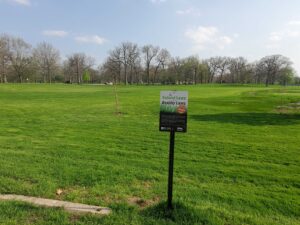Northwestern Chicago Suburb commits to 12 Pesticide Free Zones.
 The City of Elgin has designated approximately 26.45 acres of parkland for avoiding synthetic pesticide applications.
The City of Elgin has designated approximately 26.45 acres of parkland for avoiding synthetic pesticide applications.
“We are always looking for opportunities to offer sustainable land management practices that limit or eliminate any herbicide-related chemical exposure while still maintaining weed control and aesthetic quality in our high-visibility areas,” said Elgin Parks and Facilities Superintendent Greg Hulke. “This year we identified eight new sites to designate as Pesticide Free Zones, thanks to staff’s collaboration with the Elgin Sustainability Commission and non-profit sustainable landscaping initiative Midwest Grows Green.”
Last year, the City of Elgin designated four Pesticide Free Zones to help achieve many goals and objectives outlined in the City’s Sustainability Action Plan and the Metropolitan Mayors Caucus’ Greenest Region Compact 2. Midwest Grows Green and the City of Elgin’s Sustainability Commission have helped the city expand the Pesticide Free Zone program to 12 total sites. These sites include the “old library lot” (near the southwest corner of Kimball and Grove), the Ann-Douglas Park Butterfly Garden, Central Park, Corley Dr. Park, Kirk and Kramer Park, Marie Grolich Park, Willow Creek Park, Randall Ridge Park, Summerhill Park, Trillium Park, Congdon and Blackhawk water tower and sections of Lords Park.
Elgin strives to grow a deep and densely rooted turfgrass system to disrupt the life cycle of pests and weeds in the Pesticide Free Zones. Practices that help the grass include mowing no lower than three inches, overseeding bare soil and core aerating compacted soil. Last fall, MGG and the City of Elgin arranged for the delivery of 120 cubic yards of compost to improve soil quality of the Lord’s Park Pesticide Free Zone.
“The high organic matter content of the compost improved turfgrass and soil performance at Lords Park by reducing compaction, increasing the water holding capacity and, most importantly, eliminating chemical inputs,” said Ryan Anderson, MGG’s leader and the Community IPM Manager for the IPM Institute of North America.
To learn more about sustainable landscaping and apply these practices to your own lawn, please visit and take the MGG pledge at bit.ly/MGGpldg.
A couple of easy steps to manage your lawn naturally, effectively and safely include:
- Water Deeply and Infrequently: This encourages deep root growth. Aim for one inch per week. You can easily measure that amount by placing a cup in your yard while watering. You’re done watering for the week when the cup fills one inch deep. Water early in the morning to minimize disease problems.
- Mow High: Keep your lawn mowed at three inches or higher (but not higher than 8 inches per city code). This increases root strength and naturally shades out weeds, so your grass withstands drought and stays green longer. Don’t mow unless needed.
- Use Organic Fertilizer: Commercial fertilizers easily wash away, polluting nearby lakes and streams. Many contain toxic weed killers. Choose an organic fertilizer to capture and deliver nutrients in the lawn throughout the growing season. Keep grass clippings on the lawn as they provide an excellent natural fertilizer.
- Weed Naturally: Proper lawn care maintenance naturally eliminates most weeds. Annual reseeding gives grass an advantage over weeds. Avoid using pesticides, as they can harm other beneficial living things such as bees, worms, and birds. The right tool makes quick work of weeding. After pulling weeds, use grass seed and soil to fill in the hole. Your grass will grow strong and healthy as a result.
About Midwest Grows Green
Midwest Grows Green is an initiative of the 501(c)3 non-profit IPM Institute of North America, Inc. that educates and empowers citizens to take sustainable landscaping action that reduces harmful runoff into our waterways, protects the health of our most vulnerable citizens and reduces negative impacts of pesticides on non-target species such as pollinators.
For more information about the IPM Institute and Midwest Grows Green please visit www.MidwestGrowsGreen.org.
About Elgin, Illinois
Nestled along the banks of the Fox River, Elgin, Illinois is approximately 38 miles northwest of downtown Chicago and is home to nearly 115,000 people. The growing city enjoys ready access to public transportation, diverse housing stock and a mix of commercial establishments. The city’s AAA bond rating is testament to its strong financial management and solid economic environment. Many national and international businesses have taken advantage of Elgin’s close proximity to the Elgin-O’Hare Tollway and to the “Golden Corridor of Technology and Commerce” along Interstate-90. Elgin features a nationally acclaimed library system, an array of healthcare options and educational opportunities for all ages. Residents and visitors enjoy a thriving cultural arts community, world-class parks, award-winning golf courses, historical museums and nearly 200 places of worship. This vibrant, diverse and volunteer-rich community is known for its strong history of civic engagement.
